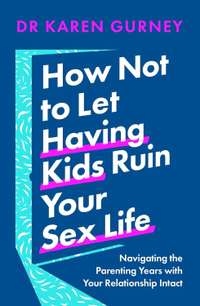Have you tried 'scheduling sex' and it's still not working for you? A sex psychologist shares why 'all that does is create pressure' (and what to consider instead)
"Never, ever schedule sex"


A sex expert has shared why she thinks scheduling sex might not give your sex life the boost you're looking for. Here's what she suggests instead...
If you're a parent, then you'll know that after dinnertime, bathtime and bedtime (and possibly a tantrum or two in between), often the last thing you feel like doing is having sex. Parenting is so demanding, it's no wonder that half of British parents are too tired to have sex (and if you're feeling like you've gone off sex altogether, trust us, you're not alone).
But even though your children take priority over your sex life, it's important to still make some time to work on your relationship and check in with your partner. If you've tried ways to spice up your relationship and that still proves to be too demanding, you might have decided to schedule sex instead. It might not scream passion, but it gives you the opportunity to get yourself in the mood, you know that you'll both have a clear schedule, and you can have a conversation in advance with your partner about what you might want from your time together.
But despite the benefits, clinical psychologist and sex expert Dr Karen Gurney (aka The Sex Doctor) has explained why couples should "never, ever schedule sex". Appearing on The Diary of a CEO podcast, hosted by entrepreneur Steven Bartlett, Dr Gurney explained, "It's one of our sexual scripts that spontaneous sex is better, and I don't necessarily agree with that, but I do agree with the idea that scheduling sex just creates pressure for everyone."
Explaining her stance further, she said: "How can you, in advance, agree to something that you don't know if you're gonna feel like when you get there? And all that does is create pressure."
A post shared by The Diary Of A CEO (Official Podcast Page)
A photo posted by thediaryofaceopodcast on
However, Dr Gurney doesn't expect busy parents to make every moment of physical intimacy spontaneous - quite the opposite, in fact. She explains, "What you should do in today's day and age is schedule physical intimacy, schedule some type of sexual currency, because we're so busy [that] if you don't do that, when is it going to happen?"
Host Steven then raised the point that "If you're parents and you get one date night a week, we all know when we need to make this thing happen. So it becomes scheduling sex, because you're scheduling date night once a week."
GoodtoKnow Newsletter
Parenting advice, hot topics, best buys and family finance tips delivered straight to your inbox.
In response, Dr Gurney explains there are two approaches you can take to your sex life: you don't initiate sex very often and wait until date night - when the pressure is high - which she describes as "the worst set of circumstances" for great sex. Or, the other option is to try your best to schedule brief moments of physical intimacy that could potentially lead to sex.
Explaining why the second option is better, Dr Gurney uses the example of having a bath together. She says, "You're right that you may start to build up an expectation that every time we say we'll have a bath together, we end up having sex. But when you invite someone into the bath, you are inviting them into the bath - you're not inviting them [by] saying 'Let's have a bath and have sex afterwards'."
She adds, "The fact that you both know where the bath might lead is fine, because it allows you to get into that headspace of 'I hadn't thought about sex tonight, but the bath might lead to sex, so let me get into a sexual headspace for a minute'."
But with a word of warning, Dr Gurney says, "The problem comes when you say to [your partner] afterwards, 'You said you wanted a bath and we've not had sex.' Well that wasn't what you invited them into, you invited them into the bath. You have to be ok if it doesn't lead to that."
Calling it a "scatter gun" approach, Dr Gurney explains that if you initiate these things often, more of these instances will likely lead to sex, in comparison to hoping that one occasion of high pressure will lead that way.
But remember, there is no right or wrong way to navigate your sex life, especially after having kids. You'll need to find a new groove, maybe a way to feel desirable again, and there are so many more variables to consider. All couples are different, so make sure to do what works for you - some swear by scheduling sex and that's totally fine!
Meanwhile, if you're a parent of young children and are looking for more ways to keep sexual satisfaction high while juggling busy family life, Dr Karen Gurney's book, How Not to Let Having Kids Ruin Your Sex Life, could help. Coming out in April 2024, it's now available to pre-order.
How Not to Let Having Kids Ruin Your Sex Life - £15.63 | Amazon
In this essential book for parents everywhere, Dr Karen Gurney will show you how to navigate the changes to your intimate lives that starting a family inevitably brings - and ensure you have great sex, forever.
Looking for something new to try in bed that will help you connect with your partner? Here's everything to know about tantric sex. Meanwhile, we've asked the experts for the most common reasons couples stop having sex (and trust us, you're not alone) as well as five tips to help you like being with your partner again.

Ellie is GoodtoKnow’s Family News Editor and covers all the latest trends in the parenting world - from relationship advice and baby names to wellbeing and self-care ideas for busy mums. Ellie is also an NCTJ-qualified journalist and has a distinction in MA Magazine Journalism from Nottingham Trent University and a first-class degree in Journalism from Cardiff University. Previously, Ellie has worked with BBC Good Food, The Big Issue, and the Nottingham Post, as well as freelancing as an arts and entertainment writer alongside her studies. When she’s not got her nose in a book, you’ll probably find Ellie jogging around her local park, indulging in an insta-worthy restaurant, or watching Netflix’s newest true crime documentary.
